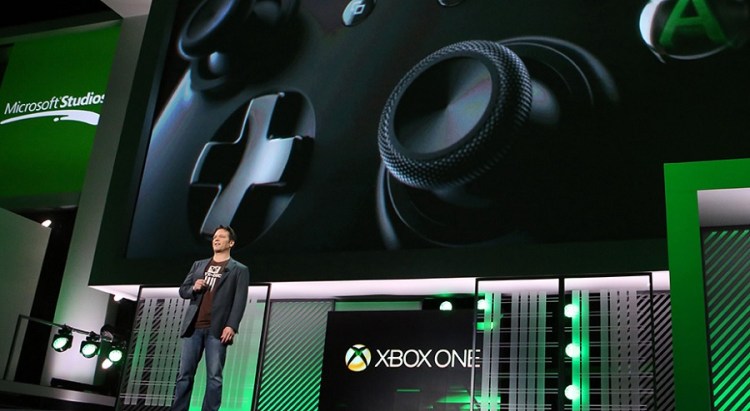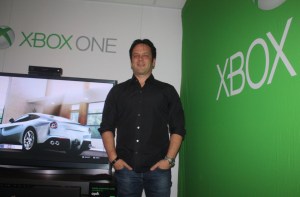Phil Spencer aims to make his company and Xbox brand more popular among gamers. The new head of the Xbox business at Microsoft said in an interview with GamesBeat this morning that he wants gaming to be a “first-class citizen in everything Microsoft does.” And he’s got the credibility to do that, since he has been running game development at Microsoft’s internal studios for many years.
Microsoft chief executive Satya Nadella announced this morning that Spencer would replace Marc Whitten, who left to become the chief technology officer at audio tech firm Sonos. The choice isn’t a surprise, as Spencer has been running Microsoft internal game development since 2008, and he replaced Whitten in a talk at the recent Game Developers Conference in San Francisco.
In that talk, Spencer acknowledged in hindsight that Microsoft could have been more aware of fan sensibilities when it made decisions last year such as prohibiting the sale of used games on the Xbox One. The company reversed that decision. But some damage was done, as Sony’s PlayStation 4, which costs $400 compared to the Xbox One’s $500, has been outselling Microsoft’s new game console since both debuted in November.
Spencer’s job is to turn that around, starting with a deeper relationship with fans. We spoke with Spencer on Tuesday morning shortly after the announcement. Here’s an edited transcript of our talks.
GamesBeat: I saw from your blog post that you would like to move closer to the fans? Can you elaborate on that?
Phil Spencer: For me, in the last 12 months, I’ve found the feedback, both positive and negative, from the fans of the Xbox brand, to be incredibly important part of building our strategy. Many of them have been with us for many years. They have grown up with some of the franchises that we have built. They want to be fans of what we do and the products we build. Being in touch with that community is an incredibly important part of having a consumer product like Xbox.
That is something I invest time in. Building those relationships. Going to the shows. Being active on Twitter. I want that feedback loop to remain as an important part of how we build the program. It really led to the discussions I had with Satya Nadella, our new CEO; Terry Myerson, head of operating systems group; and Stephen Elop, head of the devices group. It was about creating a unified Xbox software team where that same feedback loop could work, where you had studios creating our hit franchises. They can push back on the platform team, and the platform team can push back on new innovations they are creating. So the feedback loop between creator and platform developer is tight. I want to see that between the leaders of the program and the customers that we have.
 GamesBeat: Once upon a time, the top Xbox executive reported directly to the CEO. Why is this structure, where you report to Myerson and communicate with Elop, good for Xbox?
GamesBeat: Once upon a time, the top Xbox executive reported directly to the CEO. Why is this structure, where you report to Myerson and communicate with Elop, good for Xbox?
Spencer: This was part of the discussions that we had, where this position would report. I see gaming as a first-class citizen in everything Microsoft does across all our platforms with consumers. Terry Myerson runs the platform team inside the company’s operating system group. He has the Windows team, the Windows Phone team, and the Xbox platform team. I want to be sitting at the leadership table on all of the platform groups and push on what gaming and entertainment can mean. When you think about PC gaming, and you think about the engagement that people have on their phones when playing games, I think that’s a rich place for us to have a leadership team. I will lead the Xbox efforts, and the OS team and I will talk a lot about the future roadmap for those platforms.
GamesBeat: It seems like the fan-focused strategy is a necessity in competing with Sony, which has a good machine out there, right?
Spencer: As I said, I have learned a ton from the fan feedback I get. I’d like to think that every great idea comes out of our company, but they don’t. We are making sure that we are listening and that feedback is open. That makes all of us better. There are people out there who are fans and they have a connection to all that we are doing. I want to make sure we are listening.
GamesBeat: What’s going to stay the same? What’s going to change?
Spencer: When you put the person who has been driving on games in charge of the group, you can imagine the focus on games will still be there. I’m going to lead this program from gaming first. That core customer for a gaming console is the customer we have to win. Today, gaming consoles do more than just games. You see that not only from us and our competitors as well. I want to make sure that our platform is a great one for the entertainment services. We bring together Xbox Video and Xbox Music into the organization with Xbox Live. We want to program Xbox Live in a complete way and have the best entertainment services there. Many of them are great third-party partners like Netflix and Hulu. But leading with gaming is what you are going to get with me. I’m honored to be the head of the group.
GamesBeat: What can you say about the roadmap now?
Spencer: The E3 [Electronic Entertainment Expo, the largest U.S. game event] lineup is something I have been spending a lot of time with. I have been having more conversations with third-party partners. As head of first-party, that’s not something I would have done in the past. We are going through what I call our line-up reviews and what we will have on the show floor. It’s going to be a nice E3 this year. I am looking forward to conversations with EA, Activision, Ubisoft, Take-Two and the like. Our third-party partners have been so important to our success. Talking to new partners about bringing content to our platform is going to feel very natural to me. Gaming consoles win big on content, and I am very focused on the content roadmap we have right now.
GamesBeat: As far as being competitive against Sony now, you still face the perception that it has the better value with a $400 machine versus your $500 machine. What is your selling proposition now?
Spencer: I know you know we have had the most successful launch we have ever had with an Xbox console with Xbox One. Coming off the heels of the Titanfall launch, which was incredibly successful for us, we want to make sure we have a great value proposition for our consumers. They are investing in games. We want to deliver the best end-to-end experiences and focus on that value proposition. That will meet the needs of the customers that are out there.
Six months ago, people were talking about the death of the consoles and if this generation would be important at all, for either Sony or us. Now here we are, both doing incredibly well. We are early in a multi-year cycle for both consoles. We will compete heavily. But it’s great to be in this business now with two really successful consoles. It’s a great thing for gamers, and we will remain committed.

VentureBeat's mission is to be a digital town square for technical decision-makers to gain knowledge about transformative enterprise technology and transact. Learn More






![Reblog this post [with Zemanta]](http://img.zemanta.com/reblog_e.png?x-id=47b43353-dce7-4cd0-a026-81a5625c0ead)
